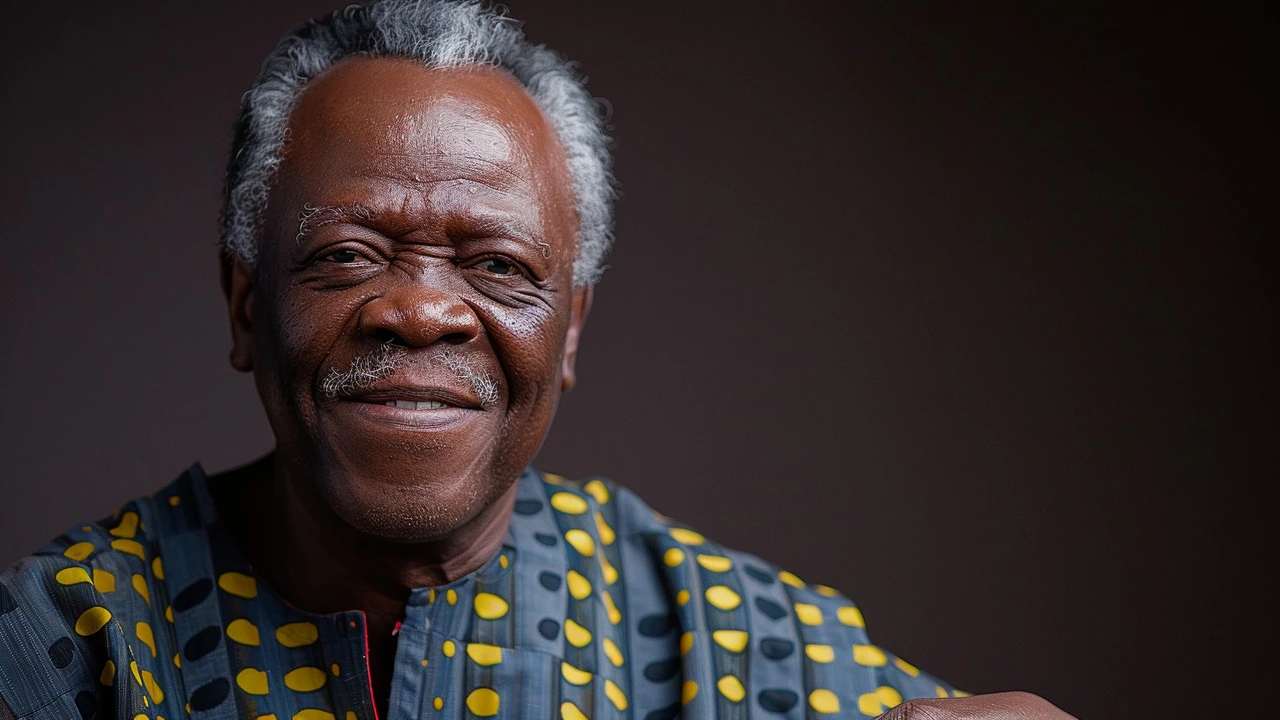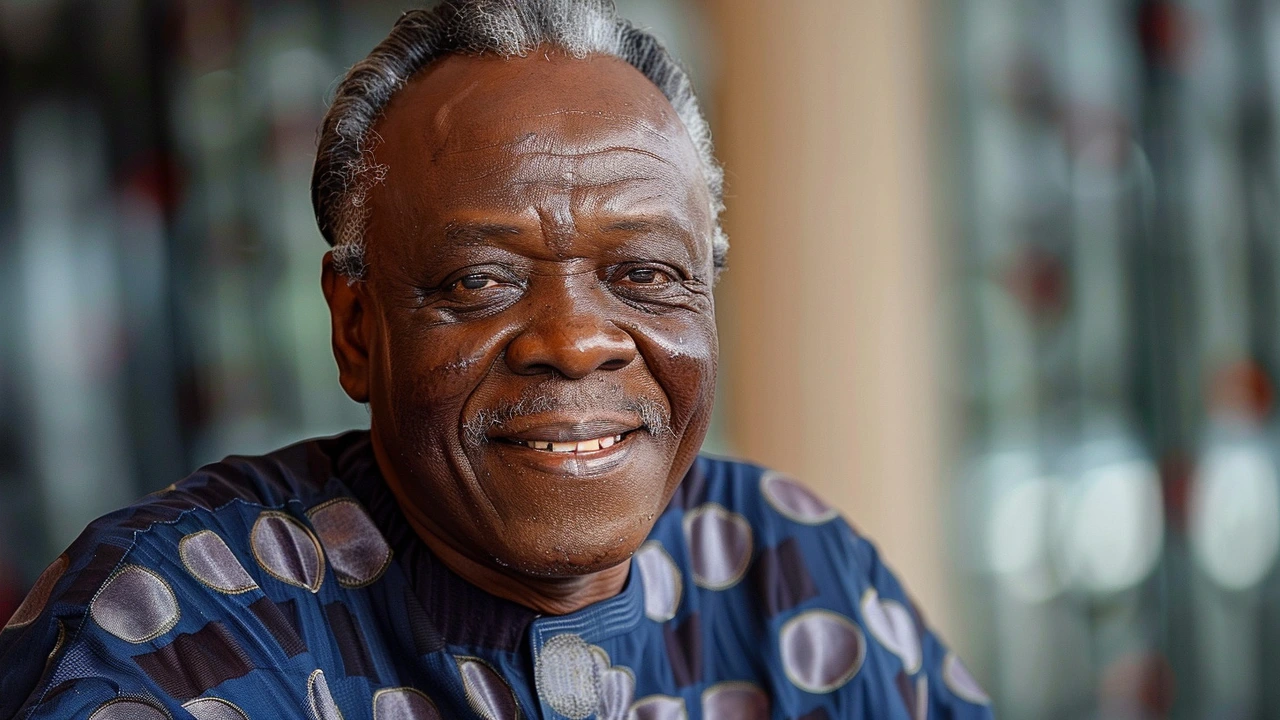The Legacy of Olu Jacobs: A Pillar of Nollywood
The Nigerian film industry, fondly known as Nollywood, has lost one of its most illustrious figures, Olu Jacobs, who passed away at the age of 82. The veteran actor's death has sent ripples of grief throughout the entertainment community, sparking an outpouring of heartfelt tributes from fans and fellow actors alike. Jacobs' passing marks the end of an era in Nollywood; his contributions to the industry were profound and irreplaceable.
A Storied Career
Olu Jacobs' career in acting began long before Nollywood became the powerhouse it is today. His journey started on the stages of London, where he honed his craft and developed a knack for delivering powerful performances. Jacobs' transition from stage to screen was seamless, and he quickly became a beloved figure in Nigerian cinema. Over the years, he portrayed a diverse array of characters, each role etched in the memories of his audience.
From playing royalty to ordinary men facing extraordinary circumstances, Jacobs' versatility knew no bounds. His ability to embody different personas with authenticity made him a sought-after actor and a director's dream. Movies such as 'The Dogs of War' and 'Ashanti' showcased his range, capturing imaginations and inspiring aspiring actors across the continent.
Global Recognition
Jacobs was more than just a national treasure; he garnered international recognition for his work. His performances resonated with audiences far beyond Nigeria's borders, and he played a pivotal role in placing Nollywood on the global map. For many, Jacobs was the face of African cinema, symbolizing the richness and depth that Nollywood offers. This global reach not only elevated his career but also drew attention to the potential of Nigerian filmmakers and actors on an international stage.

The Man Behind the Roles
Despite his fame, Olu Jacobs remained a humble and grounded individual. Those who had the privilege of knowing him often speak of his warmth, generosity, and unwavering commitment to his family. His marriage to Joke Silva, a respected actress in her own right, was a testament to a beautiful partnership both on and off the screen. The two were a power couple in Nollywood, often inspiring their colleagues and fans with their love and mutual respect.
Joke Silva once described her husband as her biggest blessing, and their relationship was indeed a cornerstone of their lives. Together, they navigated the often tumultuous waters of the entertainment industry, lending each other support and creating a legacy that will be remembered for generations.
Tributes Pour In
The news of Olu Jacobs' death has led to an avalanche of tributes on social media. Fans, colleagues, and even international celebrities have come forward to share their memories and express their sorrow. Many have recalled his memorable roles and the profound impact he had on their lives, both personally and professionally. His ability to connect with audiences and portray human experiences with depth and sincerity was often highlighted.
One tribute from a fellow actor read, 'Olu Jacobs was not just an actor; he was an institution. His dedication to his craft and the wisdom he imparted to the younger generation have left an indelible mark. His passing is a massive loss to Nollywood and the world.'
An Undeniable Legacy
Olu Jacobs' passing is undoubtedly a significant loss to Nollywood and the global film community. However, his legacy remains immense and far-reaching. He has left behind a body of work that serves as a beacon for aspiring actors and filmmakers. His influence is evident in the generations of actors who have followed, many of whom credit Jacobs with inspiring and mentoring them.
Beyond his filmography, Jacobs' impact can also be seen in the way Nollywood has evolved over the years. His commitment to excellence and his passion for storytelling have set a standard for others to aspire to. His work ethic and pursuit of authenticity in his performances have raised the bar, encouraging the industry to strive for greater heights.
Remembering the Icon
As the world remembers Olu Jacobs, it is essential to celebrate the extraordinary talent and the human being behind the iconic roles. His life was a testament to the power of film to bridge cultures and create lasting connections. As fans and colleagues mourn his loss, they also honor the rich legacy he has left behind—a legacy characterized by talent, dedication, and an enduring passion for the arts.
Final Thoughts
Olu Jacobs will be remembered not just for the characters he brought to life on screen but for the life he lived off it. His contributions to Nigerian cinema have laid a foundation for future generations, and his influence will continue to be felt for years to come. Nollywood has lost a giant, but the world has gained an everlasting legacy of brilliance and inspiration.







Steve Dunkerley
It is profoundly moving to contemplate the indelible imprint Olu Jacobs has left on Nollywood’s cinematic canon. His methodological approach to character embodiment set a benchmark for methodological realism in African filmic praxis. Moreover, his collaborative ethos fostered a synergetic environment that accelerated talent development across generational cohorts. The breadth of his oeuvre, spanning from theatrical dramaturgy to transnational productions, illustrates a versatile adaptability that remains unparalleled. In memory of his legacy, industry professionals should continue to espouse the rigorous standards he championed.
Jasmine Hinds
Olu Jacobs was an absolute legend 😍 his work inspired countless dreamers 😎❤️ keep his spirit alive!!
Madison Neal
Reading about Olu Jacobs feels like revisiting a masterclass in emotive storytelling. His nuanced performances consistently resonated with audiences, bridging cultural divides. The mentorship he offered to emerging actors cultivated a sustainable talent pipeline within Nollywood. It’s heartening to see the community rallying to honor his contributions. His legacy will undoubtedly continue to inform artistic praxis for years to come.
John Crulz
When you look back at the evolution of Nollywood, Olu Jacobs stands as a pivotal axis around which many narrative innovations revolve. He entered the scene at a time when the industry was still nascent, yet his professionalism elevated the perception of African cinema on the global stage. His ability to effortlessly transition from Shakespearean theater to modern Nigerian drama showcased a rare versatility, one that many contemporaries aspired to emulate. Jacobs’ performances were not simply acts; they were cultural dialogues that spoke to both local and diaspora audiences. He consistently chose roles that challenged societal norms, thereby fostering critical discourse through entertainment. The depth he brought to characters like the stoic patriarch or the conflicted revolutionary added layers of psychological complexity that were previously uncommon in regional filmmaking. By collaborating with both local and international directors, he helped forge cross‑cultural partnerships that expanded Nollywood’s market reach. His dedication to mentoring younger talent created a ripple effect, producing a generation of actors who internalized his work ethic and artistic integrity. In addition, his marriage to Joke Silva served as a testament to artistic partnership, illustrating how two creative forces can amplify each other's impact. Their combined body of work not only enriched the filmography of the era but also set a benchmark for professional collaboration. Even after his passing, the industry continues to feel his presence-whether through subtle homages in scripts, stylistic nods in cinematography, or the enduring reverence of fans on social media platforms. Scholars frequently reference his career when discussing the decolonization of African narratives, noting how his roles subverted Western stereotypes. The awards and accolades he accumulated over decades serve as empirical evidence of his unparalleled contribution to the arts. Moreover, his advocacy for better production standards helped catalyze infrastructural improvements within the Nigerian film sector. The collective mourning we witness today underscores the profound void his absence creates, not just in entertainment but in cultural identity formation. As we celebrate his legacy, we must also commit to preserving the standards he embodied, ensuring that future storytellers inherit a robust, ethically grounded, and creatively vibrant industry. In short, Olu Jacobs was not merely an actor; he was an institution whose influence will reverberate for generations.
Susan Mark
Absolutely, John's reflection captures why Jacobs is such a monumental figure. His emphasis on mentorship resonates with many who benefited directly from his guidance. For anyone seeking to study his technique, I recommend watching his early stage recordings for insight into his method acting roots.
Anita Drake
Olu Jacobs’ journey exemplifies the power of cultural exchange and artistic collaboration. By bridging Nigerian narratives with global perspectives, he fostered a more inclusive cinematic dialogue. His legacy serves as a beacon for emerging filmmakers who aim to represent diverse voices. Let us continue to honor his memory by supporting stories that reflect our shared humanity.
Eduardo Lopez
One cannot help but lament the loss of such a paragon of artistic virtue. Jacobs transcended the pedestrian trappings of commercial cinema, elevating the medium to a form of high cultural discourse. It is incumbent upon us, the discerning audience, to uphold the standards he so deftly embodied. Let us not diminish his contributions with merely nostalgic platitudes; rather, we must strive to emulate his unwavering commitment to excellence.
Nancy Perez de Lezama
His impact was massive.
Matt Heitz
Olu Jacobs embodied the very spirit of Nigerian resilience and artistic pride. His career illustrated how indigenous talent can dominate both local and international arenas without compromising cultural authenticity. The rigor he applied to his craft set a benchmark that many still fail to meet, reflecting a broader issue of complacency in our industry. By championing narratives rooted in Nigerian experience, he resisted the homogenizing forces of global media. His collaborations with foreign directors were not mere concessions but strategic alliances that amplified African stories on a worldwide stage. In honoring his memory, we must recommit to fostering homegrown excellence and rejecting any dilution of our artistic heritage.